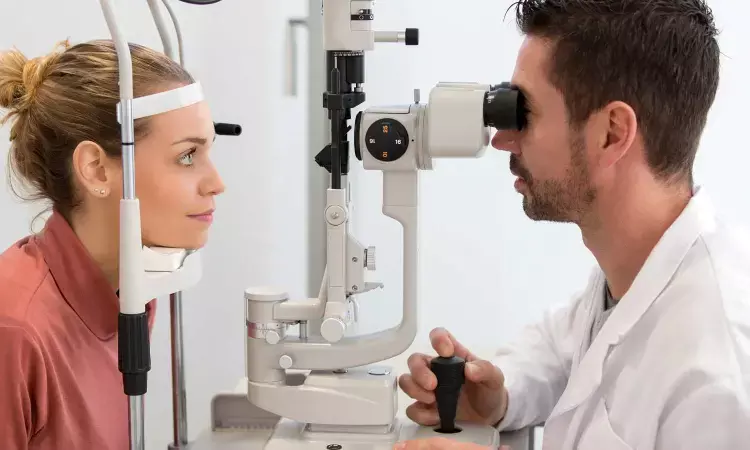- Home
- Medical news & Guidelines
- Anesthesiology
- Cardiology and CTVS
- Critical Care
- Dentistry
- Dermatology
- Diabetes and Endocrinology
- ENT
- Gastroenterology
- Medicine
- Nephrology
- Neurology
- Obstretics-Gynaecology
- Oncology
- Ophthalmology
- Orthopaedics
- Pediatrics-Neonatology
- Psychiatry
- Pulmonology
- Radiology
- Surgery
- Urology
- Laboratory Medicine
- Diet
- Nursing
- Paramedical
- Physiotherapy
- Health news
- Fact Check
- Bone Health Fact Check
- Brain Health Fact Check
- Cancer Related Fact Check
- Child Care Fact Check
- Dental and oral health fact check
- Diabetes and metabolic health fact check
- Diet and Nutrition Fact Check
- Eye and ENT Care Fact Check
- Fitness fact check
- Gut health fact check
- Heart health fact check
- Kidney health fact check
- Medical education fact check
- Men's health fact check
- Respiratory fact check
- Skin and hair care fact check
- Vaccine and Immunization fact check
- Women's health fact check
- AYUSH
- State News
- Andaman and Nicobar Islands
- Andhra Pradesh
- Arunachal Pradesh
- Assam
- Bihar
- Chandigarh
- Chattisgarh
- Dadra and Nagar Haveli
- Daman and Diu
- Delhi
- Goa
- Gujarat
- Haryana
- Himachal Pradesh
- Jammu & Kashmir
- Jharkhand
- Karnataka
- Kerala
- Ladakh
- Lakshadweep
- Madhya Pradesh
- Maharashtra
- Manipur
- Meghalaya
- Mizoram
- Nagaland
- Odisha
- Puducherry
- Punjab
- Rajasthan
- Sikkim
- Tamil Nadu
- Telangana
- Tripura
- Uttar Pradesh
- Uttrakhand
- West Bengal
- Medical Education
- Industry
Intravitreal anti-VEGF treatment for neovascular AMD tied to glaucoma progression

A study published in the Acta Ophthalmologica has concluded that Neovascular age-related macular degeneration (nAMD) coexists with glaucoma in the same eye. This co-existence is similar to the general population's prevalence of two age-related diseases.
Age-related macular degeneration and glaucoma cause permanent visual impairment in developed countries, including Finland. Intravitreal injections with anti-vascular endothelial growth factors (anti-VEGF) are the primary therapeutic approach for nAMD.
The literature mentions mixed results on glaucoma progression during anti-VEGF treatment for nAMD. It may also lead to an increased risk for glaucoma surgery.
Dr Inka Pirinen and colleagues investigated,
How often do glaucoma and nAMD occur in the same patient, and whether glaucoma progression is faster on treatment with intravitreal anti-VEGF used for managing nAMD?
Tays Eye Center's patient medical records of 6314 glaucomas and 2166 nAMD patients were available. The researchers compared changes in visual fields (mean deviation [MD], dB/year), IOP (mmHg/year) and fundus photographs (progression, yes/no) with and without anti-VEGF treatment for nAMD and ≥ 1-year follow-up.
The study results are:
• During ten years, one hundred forty-seven glaucoma patients received intravitreal anti-VEGF treatment for nAMD ( 2% of glaucoma and 7% of nAMD patients).
• The mean change in MD was −0.70 dB/year (SD 1.8) vs −0.27 dB/year (SD 1.7) in glaucoma eyes with (n = 37) and without (n = 4304) anti-VEGF injections, respectively.
• In patients with bilateral glaucoma and unilateral nAMD treated with anti-VEGF injections (n = 20), MD declined at −0.62 dB/year (SD 1.9) vs 0.33 dB/year (SD 1.5).
• The progression of glaucoma was detected in 14 of 20 vs 10 of 20 fundus photographs in eyes with anti-VEGF treatment compared with their untreated fellow eyes.
To conclude, intravitreal anti-VEGF treatment for nAMD may accelerate the progression of glaucoma. The team mentioned that nAMD requiring anti-VEGF treatment occurred in combination with glaucoma at the same rate as in the general population.
Further reading:
Pirinen, I., Leinonen, S., Helminen, M., Hujanen, P., Vaajanen, A., Tuulonen, A., & Uusitalo‐Järvinen, H. (2022). Glaucoma progression in patients receiving intravitreal anti‐VEGF treatment for neovascular age‐related macular degeneration. Acta Ophthalmologica. https://doi.org/10.1111/aos.15288
BDS, MDS in Periodontics and Implantology
Dr. Aditi Yadav is a BDS, MDS in Periodontics and Implantology. She has a clinical experience of 5 years as a laser dental surgeon. She also has a Diploma in clinical research and pharmacovigilance and is a Certified data scientist. She is currently working as a content developer in e-health services. Dr. Yadav has a keen interest in Medical Journalism and is actively involved in Medical Research writing.
Dr Kamal Kant Kohli-MBBS, DTCD- a chest specialist with more than 30 years of practice and a flair for writing clinical articles, Dr Kamal Kant Kohli joined Medical Dialogues as a Chief Editor of Medical News. Besides writing articles, as an editor, he proofreads and verifies all the medical content published on Medical Dialogues including those coming from journals, studies,medical conferences,guidelines etc. Email: drkohli@medicaldialogues.in. Contact no. 011-43720751


